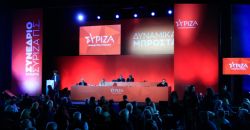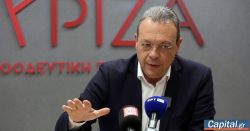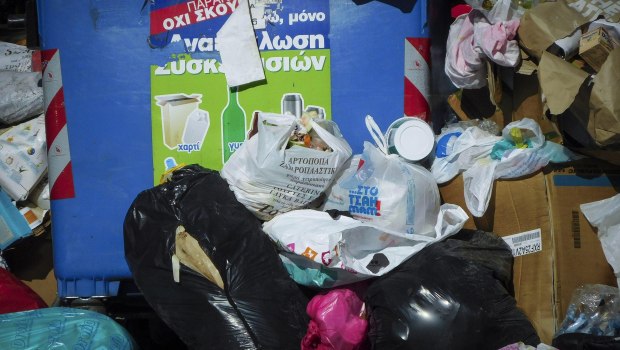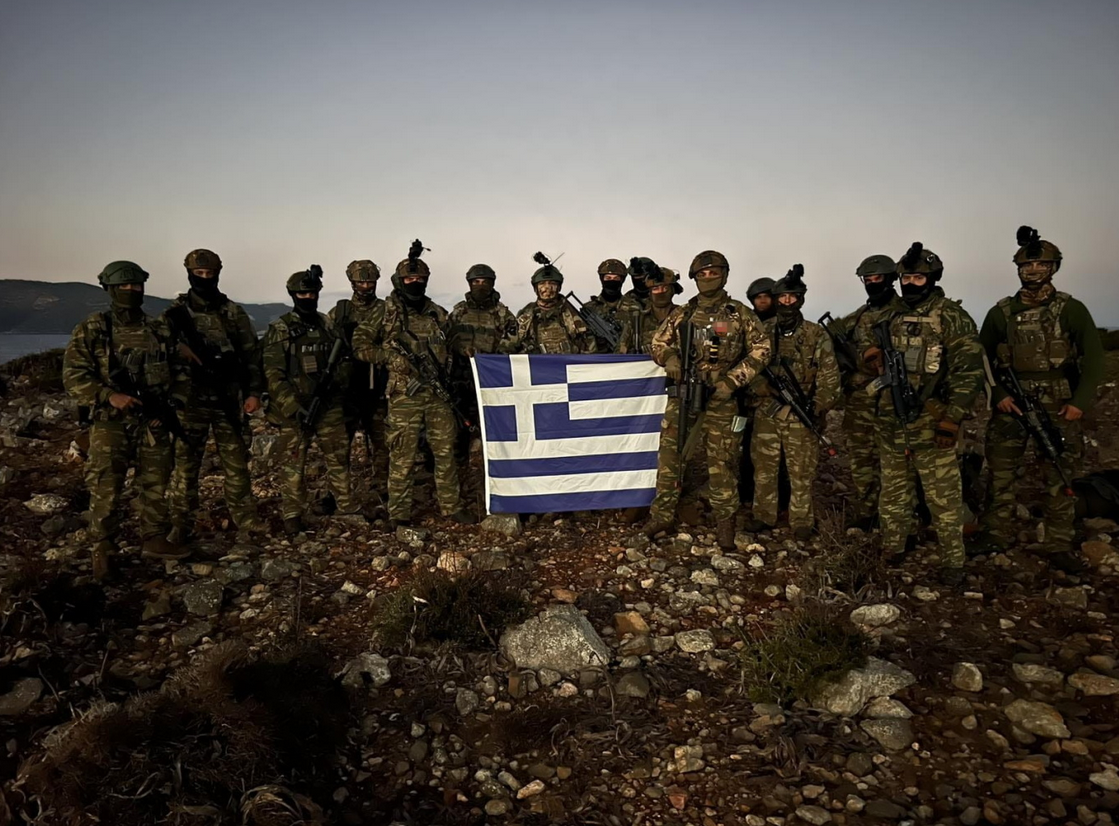Erdogan’s repressed frustrations, Netanyahu and the opposition, what (and where) Geroulano
Source: ProtoThema English
Hello, up to the time we were writing our daily news report we did not yet have a formal final picture of whether the postponed meeting between Mitsotakis and Erdogan would take place, but in general there is a Greek proverb about the… ship that is late. It didn’t seem so, however, from what a government source said late last night. We therefore know for certain that the scheduled meeting yesterday evening at 9 p.m. (Greek time) was postponed for a real reason. Trump set his meeting with the Arab countries at roughly the same time Mitsotakis was supposed to meet Erdogan (half an hour apart), so the Turk would not skip that appointment for the Greek prime minister. In the end, however, the U.S. President’s meeting with the Arab leaders was delayed by about an hour and a half, with the result that both Erdogan and Trump filled the gap with other meetings. Still, we know just as well that since Erdogan did not “find”… half an hour in his schedule today to hold the meeting, he simply did not want this meeting ever to take place. Not good, but of course not… the end of the world if the Turk doesn’t want to meet the Greek. And in this sense, the reaction of the opposition half an hour after the postponement was announced—and before they even knew for sure the meeting was canceled—is indefensible. Or rather, it is a disgrace for the country that only minutes later Greek parties rushed to attack the Greek prime minister because the Turk canceled his meeting. Honestly, I don’t believe public opinion expected such an “instant” reaction from the opposition (from PASOK to Velopoulos) and that they would be applauded for it, given one small detail—I repeat, we’re talking about a Greek and a Turk.
Is there an explanation?
Now, the cancellation, if in the end they do not meet, can be explained according to my source: First, that Greece does not recognize the Palestinian state, something that bothers the Arab countries and Erdogan. But between us, if there is any chance the Turks won’t get the F-35s, it’s because of Netanyahu—so the classic “the enemy of my enemy is my friend” applies. And second, well, let’s face it, Erdogan didn’t get the same treatment under Biden, so now he’s venting his frustrations since he and Trump talk differently, especially on business matters.
Geroulanos
Meanwhile, yesterday’s packed events in New York overshadowed a clear warning Geroulanos gave to Androulakis. “If the needle (he meant the polls) doesn’t move upward in the next two months, we’ll have a problem moving it by the elections,” Pavlos said, addressing our leader Nikos A. To tell you the truth, I don’t know how PASOK’s needle will move upward in the next two months, but I do see a tendency from Pavlos, Haris, and Anna to… let’s put it politely, wag their finger at Nikos.
The meeting with al-Sarra
From K.M.’s meetings in New York, I can discern one that is probably important and was not announced in his initial program. I’m referring to the one-on-one expected with the transitional president of Syria, al-Sarra (formerly Joulani), who from being wanted is now suited up and mingling among diplomats. This is not the first time they have met, since they had also attended a four-way meeting in Paris, but for us, the Middle East is objectively of particular interest.
Maximos’ appointments
After the formal confirmation of Maximos Charakopoulos’ appointment as secretary general of New Democracy’s parliamentary group, the Larissa politician has started meeting various MPs, trying both to “warm up” the atmosphere and to assign roles for the daily work. Speaking of ND MPs, with Maximos now leading appearances in the media, I notice various people are beginning to “gain confidence” and ask for Samaras’ return. The question, of course, is whether they’re speaking to deaf ears, since such a reconciliation is by no means an easy exercise.
Xenokostas looking at shipyards
A few weeks ago, Panos Xenokostas received an official invitation from U.S. Secretary of the Interior Doug Burgum to visit the United States. Having seen firsthand the “resurrection” of the shipyards achieved by ONEX in Syros and Elefsina, Burgum is said to have asked P. Xenokostas to visit American shipyards in order to examine the possibility of acquiring them. According to information, the ONEX boss has already visited two U.S. shipyards and in the coming period plans to visit two more.
And close by, Theodorikakos
The government is rushing to take advantage of the favorable climate created for the Hellenic Shipyards. A significant share of the effort to strengthen Greece’s shipbuilding industry is now being shouldered by Takis Theodorikakos. The Minister of Development has undertaken drastic initiatives to boost the competitiveness of the shipyards, while in the coming period he is expected to bring to Parliament a new package of important legislative changes. For the first time, the shipbuilding industry has been included in the new Development Law as part of flagship and strategic investments, giving it a privileged status. The next step, according to information, will be the submission of the specific legislative framework to Parliament, which will include comprehensive measures for the revival of Greece’s shipbuilding industry as a strategic sector, with emphasis on port infrastructure and energy transition through new technologies. In particular, investments of €250 million have been planned for the Elefsina and Syros shipyards.
High flight for Bank of Cyprus
Bank of Cyprus celebrated its one-year anniversary on the Athens Stock Exchange and on this occasion organized a leadership dinner with journalists. The bank’s management had just returned from London, where it successfully presented to institutional investors its model focused on a 22% return on equity, CET1 above 20.6%, and dividend distributions this year reaching 70%. During its one year on the Athens Exchange, about 20% of the bank’s shareholder structure changed hands, while its share price rose by 62% and—together with dividends and interim distributions—by 80%. According to Chairman Takis Arapoglou and CEO Panicos Nicolaou, the bank’s strategy includes selective expansion abroad with lending to large corporations and shipping, aiming for the foreign portfolio to reach €1.5 billion. Among the most interesting points raised by management was that mortgage lending in Cyprus totals €1.2 billion annually (compared to €1 billion in Greece).
The dangerous flirtation of Proodeftiki
The general meetings of Proodeftiki usually have a… family character. Very few attendees, who generally know each other. Last week (19/9/25) at the company’s general meeting, however, two fresh faces showed up. Naturally, the newcomers drew attention, especially when they declared that they were not shareholders but from the Hellenic Capital Market Commission, and they had come to observe the meeting to check whether corporate governance was being followed and to see the procedures up close. At first, Proodeftiki’s management was surprised and then rather shaken by the unexpected visitors, who settled in the room and observed the proceedings. I have never heard of Capital Market Commission officials attending a general assembly, so I assume more surprises are to come. I remind you that on August 7 the HCMC had sent a letter to Proodeftiki about rumors of a business partnership, with Proodeftiki replying: “If and when any agreement arises, the Company will make the necessary announcements to the investment community.” Letters, visits, a dangerous flirtation…
Strong demand for GEK TERNA bond
Strong demand was recorded on the first day of the public offering for the GEK TERNA bond, according to market sources. Specifically, demand reached the level of the issue, while it is estimated to remain high over the next two days. The public offering ends tomorrow, Thursday, September 25, and the interest rate range has been set between 3.20% – 3.50%. The group will use the €500 million proceeds to implement its development plans.
Qualco wants to play in the big leagues
Qualco’s management has scheduled the announcement of its half-year results for Monday, September 29 (€5.75 +0.52%). At the same time, the company has decided to organize an informational event to present the full range of its activities, since most still view it simply as a “bad debt manager and collector.” The company has already agreed and secured a third Market Maker on the stock exchange, aiming to become a “high liquidity” listed firm. At the same time, it is also looking to improve its capitalization (currently €401 million) with the help of acquisitions. In June it acquired Empedus to develop the company’s technology arm, and in July it bought Cenobe, a cybersecurity specialist.
Climbing for Trade Estates, shallow waters for Fourlis
With slow and steady steps, Trade Estates is narrowing the gap from its IPO price of €1.92, reaching €1.80 for the first time since December 2023. Yesterday it closed at €1.79, with a daily high of €1.82, having gained 4.3% over the past four days. Turnover in Tuesday’s session was higher than usual, exceeding €500k with a volume of 285k shares. Eurobank Equities sets a target price of €2.23, citing generous dividend payouts and an average annual 9% increase in rental income through 2029, driven by retail parks and logistics. The steady upward course of Trade Estates contrasts with the sharp fluctuations of its affiliate Fourlis, which has posted two consecutive days of cumulative losses of 2.55%. Yesterday it retreated below €4.40, drifting further away from its yearly high of €5.
Cenergy’s rally boosted Viohalco
Parent company Viohalco controls 71.46% of its subsidiary Cenergy. Following Cenergy’s new upward move yesterday, its market cap reached €2.629 billion. Accordingly, Viohalco’s 71.46% stake is worth €1.8 billion. Yet the entire Viohalco group (which controls ElvalHalcor, Sidenor, Sidma, Noval, Corinth Pipeworks, Stomana, Sovel, Dojran Steel, CPW America, Epirus Metalworks, etc.) is also valued at €1.8 billion today. Of course, such valuation gaps are typical for holdings. Meanwhile, Cenergy Holdings consolidated its position above €12, extending its all-time high with a 3.16% jump, closing at €12.38 and reaching €12.44 intraday. Last week Eurobank Equities had set a target of €14.1, with the upside narrowing from 20% when the report was published to 13.9% today. Gains for the stock in 2025 already exceed 31%, with capitalization touching €2.6 billion, making it the 16th most valuable company on the Athens Stock Exchange. From Cenergy’s rally, parent Viohalco also benefited, remaining on an upward trajectory for the 9th consecutive session. It even reached €7.20, a new record high.
Alumil fights on
Tomorrow morning at 10 a.m., Alumil’s management (+3.8%, €5.46) will present its half-year results to analysts via teleconference. The market rewarded the improvement in net profitability to €8.7 million. G. Mylonas cut interest expenses by €1.5 million while also managing to improve financial income by €1.1 million—likely through aluminum hedging and forex market moves. Debt remains high at €135 million, but Alumil’s presence in over 60 countries with 34 subsidiaries serves as a “natural shock absorber,” as weakness in one market can be offset by others. In markets like Turkey, where sales are compulsorily in local currency, Alumil invoices in euros and converts receipts immediately, eliminating risk. Finally, G. Mylonas noted he is not worried about the U.S.’s 50% tariffs on aluminum profiles because the company sells integrated projects. In these projects, the cost of the metal is a small part of the final price, as added value lies in engineering, design, and technology.
Tailwind for the refineries
Russian bombings of oil production units have increased the value of still-operating refineries. International oil prices remain under control (Brent at $66.2, WTI at $62.3), but refining margins are rising significantly as options shrink. In Greece, Motor Oil is valued at €2.8 billion and HelleniQ Energy at €2.56 billion. Both trade at 5–6 times their operating earnings, despite the fact that prevailing market conditions are boosting their balance sheet revenues by several tens of millions each month.
Maximos Mansion and the strengthening of the Greek registry
Shipping is among the key topics on the agenda of the Maximos Mansion. The Prime Minister wants to strengthen the Greek registry, meaning that Greek shipowners should register more of their vessels under it and fly the Greek flag. I hear the first move will be the further simplification of the procedures for registering ships, since right now a mountain of documents is required in a time-consuming process. Last week, V. Kikilias mentioned the matter to Greek shipowners in London during a dinner hosted in his honor by the Greek ambassador at the ambassador’s residence. The next step is to bring forward for discussion the bill on modernizing maritime education. The bill was supposed to be presented this fall, but I hear it has been pushed to early December. Entry scores are very low, which means that students struggle to keep up with classes and a significant percentage drop out midway through their studies. Let me remind you that under Christos Stylianides, a report by the Eugenides Foundation on upgrading maritime education had been published. It was accepted both by the Union of Greek Shipowners and by the minister, but it never went forward. It wasn’t even brought to the Council of Maritime Education of the Ministry of Shipping. Or rather, it was placed on the agenda the day before the Council’s meeting, only to be withdrawn the very next day. Maximos Mansion is moving because there is concern about the future of the Greek registry. We are seeing a steep decline in the Greek flag, which is now supported only by a handful of patriotic shipowning families.
The aging ferry fleet, the €4 billion, and the bankers
Based on new environmental laws, renewing the fleets of ferry shipping and Short Sea Shipping (SSS) is imperative. The system is collapsing because the amounts required are enormous, financing is difficult, and the time frame is running out for everyone. The implementation of the Fit for 55 package—within which in 2023 the European Commission extended the Emissions Trading System (ETS) to maritime transport, alongside the relevant action agreed within the IMO—makes the replacement and modernization of Greece’s SSS fleet urgent, as it is quite old. Over 70% of the ships are more than 30 years old. By 2030, 70–75 ferry vessels will need to be replaced due to age and the stricter emissions regulations. About €4 billion is estimated to be required for the renewal of the Greek ferry fleet, with the aim of complying with new environmental regulations and enhancing the sector’s sustainability. For these reasons, on September 30, 2025, a meeting will take place between the board of the Hellenic Chamber of Shipping and the Union of Banking and Financial Executives of Greek Shipping to discuss financing methods. However, in the background, there appear to be no investors interested in either ferries or SSS, which is particularly worrying.
Greeks in Indonesia’s shipyards and the plan for the next day
Indonesia is on a path of economic growth and consists of 17,508 islands. Now that development has arrived, the government is focusing on shipyards, aiming initially to build ferries as well as cargo vessels for Short Sea Shipping in order to transport goods between the islands. The effort is starting methodically, and Indonesians have turned their gaze toward Greece. Greek shipbuilders hold key positions, responsible for building commercial ships rather than ferries. There are also Greek shipowners who have timidly started placing orders or exploring conditions to proceed further.
The big step in America
Analysts consider the deal recently struck by Allwyn International, the parent group of OPAP, to acquire 62.3% of the American fantasy sports company PrizePicks, as an undertaking of similar significance to the years-ago plan of listing on Wall Street. The initial price of the deal amounts to $1.6 billion, valuing PrizePicks at $2.5 billion, while if specific targets are met during 2026–2028, the valuation could reach up to $4.1 billion. The acquisition will significantly strengthen Allwyn International’s presence in the vast and lucrative U.S. gaming market, particularly in Daily Fantasy Sports (DFS), which are skill-based and therefore permitted in states where betting is not yet licensed. Thus, PrizePicks, headquartered in Atlanta, Georgia, has today managed to count millions of active monthly users across more than 45 states and to post adjusted EBITDA of $339 million for the 12-month period through June 2025, with revenue growth above 60% year-on-year and strong cash flows.
Campaign stretchers (just in case)
The column was startled at the thought we might be preparing for… call-up orders when it learned that the Hellenic Corporation of Assets and Participations (HCAP) is running a tender for the procurement of 1,777 campaign stretchers. However, the tender, which will be conducted through the National Electronic Public Procurement System, concerns something different—indicative of the serious and already real impacts of climate change. HCAP, through the Strategic Significance Contracts Unit and acting on behalf of the Ministry of Climate Crisis and Civil Protection, undertook to implement the contract with a total estimated value of €109,000 plus VAT for the procurement of equipment enabling immediate accommodation of populations affected by natural disasters. Specifically, the contract involves supplying camp beds—campaign stretchers—for immediate housing after disasters, for the needs of the Ministry’s General Secretariat for Civil Protection and its local services. You see, after Daniel and everything happening due to the climate crisis, the way such situations are handled is now very different.
A Greek at the Turkish House in New York
At the Turkish House in New York the other day, the heads of corporate giants such as Amazon, Ford, Coca-Cola, IBM, GE Aerospace, Boeing Global, JPMorgan, and Bank of America were invited. From the Greek side, sitting at the same table as a guest of the Turkish President was Byron Nicolaides, Founder and CEO of PeopleCert, the Greek multinational with a global footprint. Byron Nicolaides, born in Constantinople, maintains close ties with the city and works through various initiatives to keep Hellenism alive there. An interesting detail: most of the executives from the companies that took part in the roundtable—many of them Fortune 500 firms—have made use of PeopleCert’s certifications. The company’s product portfolio is available in more than 200 countries and is used by 50,000 companies as well as 800 government organizations worldwide.
The present of the stock markets and the “golden” future of central banks
Bank of America has published a revealing chart: fund managers are thrilled with stock markets and are holding just 3.9% in cash. In contrast, central banks are stockpiling gold in their vaults. Gold reserves have surpassed 1.2 billion ounces, the highest level since the 1970s. The price of gold—just in 2025 alone—has risen by +42% to $3,825 per ounce. This year, gold has delivered triple the gains compared to the S&P 500 index on Wall Street, which itself has been breaking record after record. The picture is unusual: stocks are rising, bonds are rising, gold is rising, cryptocurrencies are rising, and housing prices are rising. Is everyone winning? Central bankers, however, are quietly hoarding gold.
Ask me anything
Explore related questions
The original article: belongs to ProtoThema English .





